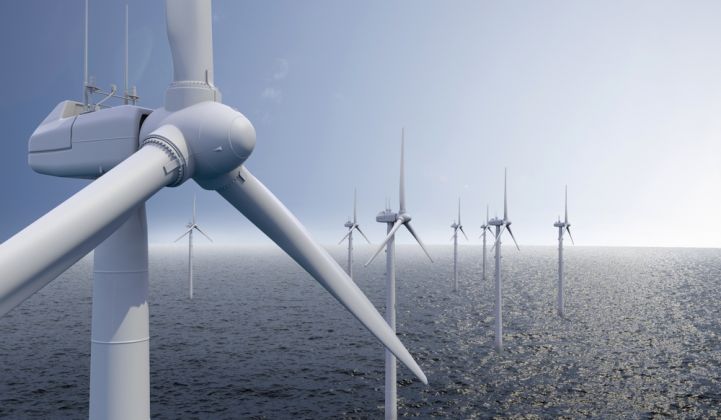French oil giant Total is moving further into renewable energy, and may target the offshore wind market next, after this week’s investment in cleantech developer EREN Renewable Energy.
On Tuesday, Total said it took a 23 percent share in the company for €237.5 million ($284.9 million), with an option to buy the rest after five years. This week, Total also bought GreenFlex, a French energy efficiency player, for an undisclosed sum.
“Total integrates climate challenge into its strategy and is pursuing steady growth in low-carbon businesses, in particular in renewable energy,” said Patrick Pouyanné, chairman and CEO of Total, in a press release.
Philippe Sauquet, Total’s president of gas, renewables and power, added that “EREN RE’s momentum will allow us to accelerate our growth in solar energy and move us into the wind power market.”
According to one analyst, offshore wind is likely where Total will invest next.
“When we looked into renewable projects and compared them to oil and gas, it was offshore wind that was providing the scale and scalability on a par with upstream mega-projects,” said Valentina Kretzschmar, director of corporate research at GTM’s parent company, Wood Mackenzie.
“Offshore wind could be the next target for Total, simply because it is really the most attractive in terms of returns and the scale it offers," she said. "It’s very comparable to the oil and gas projects that they have in their portfolio.”
So far, offshore wind remains absent from Total’s asset sheet, even though the company has perhaps gone further than any other oil major in its commitment to renewables, Kretzschmar said. Last year, the Paris-based company committed to have a fifth of its assets invested in low-carbon business ventures by 2035.
The company took an important stake in the solar sector in 2011, when it paid $1.4 billion for U.S. PV giant SunPower. In 2016, it acquired the French battery maker Saft, for $1.1 billion.
Earlier this year, the oil and gas giant set up a subsidiary, Total Solar, to develop commercial and industrial-scale PV plants. But this week’s investment in EREN Renewable Energy (EREN RE) signaled that Total mostly plans to achieve its 20 percent target through mergers and acquisitions.
EREN RE, which is due to be renamed Total Eren, has developed 650 megawatts of wind, solar and hydropower generation around the world, and is planning on a 3-gigawatt portfolio within half a decade.
Sources at EREN said that the developer is not active in the offshore wind market, but that Total’s investment will at least give the oil major more exposure to onshore projects.
In 2016, Total Energy Ventures acquired an interest in the U.S. small wind turbine leasing firm United Wind, but other than that, its experience in the wind sector has been limited.
Getting to grips with onshore wind through EREN may be a precursor to a move into the riskier, but potentially more rewarding, offshore market, said Kretzschmar.
“I think all the majors are just finding their feet in this area,” she said. “It’s still very much a learning process for them. They are investing in different technologies because, ultimately, they do not know which technology is going to win."
"Even though Total is committed to solar, now they are making a big point of diversifying into wind," she added.
In offshore wind, the oil company to watch is Statoil, which has not only kick-started the floating foundation market with its Hywind project in Scotland but is also planning to add battery storage to the mix next year.
Other European oil majors are jumping on the renewables bandwagon too. Shell, for example, owns 400 megawatts of wind generation and was said to be pondering a bid for Asian solar giant Equis Energy in July.
Over the summer, Shell's CEO said the company plans to spend up to $1 billion per year on its New Energies division by 2020. BP, meanwhile, owns almost 1.5 gigawatts of U.S. wind capacity.
There is no indication that the oil firms will abandon their core business anytime soon, though. Total’s biggest transaction in recent months, for example, was a $7.5 billion buyout of Maersk Oil & Gas.
The transaction will make Total the second-largest operator in northwest European waters, which make up the seventh-largest oil and gas-producing region in the world.
----
Come join us for GTM's first annual U.S. Power & Renewables Conference in November. You'll get an in-depth look at how the renewable energy market will interact with the U.S. power market, and how those interactions can impact overall industry development and market growth. Curated by GTM Research, MAKE and Wood Mackenzie energy analysts, we’ll take an expansive view of key issues and timely topics, bringing together a diverse group of energy experts and stakeholders to discuss demand dynamics, economics and business model shifts, and policy and regulatory implications.



